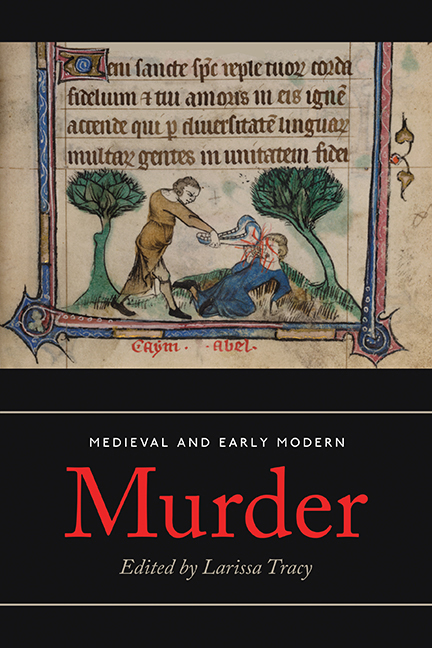Book contents
- Frontmatter
- Contents
- List of Illustrations and Tables
- Acknowledgements
- Contributors
- List of Abbreviations
- Introduction: Murder Most Foul
- I Murder on Trial: Justice, Law and Society
- II The Public Hermeneutics of Murder: Interpretation and Context
- III Murder in the Community: Gender, Youth And Family
- 13 Negotiating Murder in the Historiae of Gregory of Tours
- 14 Poisoning, Killing and Murder in the Edictus Rothari
- 15 Murder, Foul and Fair, in Shota Rustaveli's The Man in the Panther Skin
- 16 A Multiple Poisoning in the City of Valencia: Sanxo Calbó's Crime (1442)
- 17 A Case of Mariticide in Late Medieval France
- 18 Monstrous Un-Making: Maternal Infanticide and Female Agency in Early Modern England
- 19 Imps of Hell: Young People, Murder and the Early English Press
- Conclusion
- Select Bibliography
- Index
14 - Poisoning, Killing and Murder in the Edictus Rothari
from III - Murder in the Community: Gender, Youth And Family
Published online by Cambridge University Press: 05 July 2018
- Frontmatter
- Contents
- List of Illustrations and Tables
- Acknowledgements
- Contributors
- List of Abbreviations
- Introduction: Murder Most Foul
- I Murder on Trial: Justice, Law and Society
- II The Public Hermeneutics of Murder: Interpretation and Context
- III Murder in the Community: Gender, Youth And Family
- 13 Negotiating Murder in the Historiae of Gregory of Tours
- 14 Poisoning, Killing and Murder in the Edictus Rothari
- 15 Murder, Foul and Fair, in Shota Rustaveli's The Man in the Panther Skin
- 16 A Multiple Poisoning in the City of Valencia: Sanxo Calbó's Crime (1442)
- 17 A Case of Mariticide in Late Medieval France
- 18 Monstrous Un-Making: Maternal Infanticide and Female Agency in Early Modern England
- 19 Imps of Hell: Young People, Murder and the Early English Press
- Conclusion
- Select Bibliography
- Index
Summary
VENENUM, OR POISONING, takes a small but interesting role in the early medieval Edictus Rothari, the first written version of the Lombard laws, promulgated in the name of King Rothari on 22 November 643. In two adjacent clauses in the Edictus, the Lombard law-givers outline the extent of composition due in compensation for the act of killing with poison: Rothari No. 141, in which the perpetrator is free, and Rothari No. 142, in which the perpetrator is a servus aut ancilla [enslaved man or woman]. In both clauses, the composition due is equal to the financial worth of the victim according to their status in Lombard society, to be paid by the poisoner or their owner if the deed was committed by a servus or ancilla. Poison seems, by its very nature, to be ideally suited for secretive, nefarious killings, and modern scholars have considered poisoning as a means of murder, or attempted murder, within the legal contexts of early medieval law as a whole. Two other clauses in the Edictus address cases where a ‘homo liber aut mulier libera’ [free man or free woman] either plots to poison someone (Rothari No. 139) or else actually administers poison but fails to kill their victim (Rothari No. 140). Rothari No. 142 also discusses plots and non-lethal outcomes of a poisoning attempt when committed by a servus or ancilla. The Lombard law-givers, then, arranged the clauses on poisoning along two axes, first by descending social class of the perpetrator, free and unfree, then subdividing these in increasing severity of the outcome. The Lombard law-givers never specify the actual types of poison that may have been employed, be it the wrong type of mushrooms ending up in the cooking pot or arsenic left over from silver smelting. Instead, the concern in the Edictus is simply that a person, man or woman, free or enslaved, poisoned another. The main focus here is to problematise the relationship of poisoning to killing and murder in the Lombard legal imagination of the mid seventh century, to break the assumed connection between poisoning and murder, nefariousness and shameful acts, and to demonstrate, instead, that poisoning in the Edictus, while still a crime, should be considered in relation to deliberate, open means of killing, but aligned with a broader spectrum of class and gender than killing with more ordinary weapons.
- Type
- Chapter
- Information
- Medieval and Early Modern MurderLegal, Literary and Historical Contexts, pp. 333 - 349Publisher: Boydell & BrewerPrint publication year: 2018

